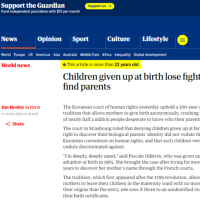
赤ちゃんポストと出自を知る権利の問題は今も根深いです。
2000年にドイツで「赤ちゃんポスト」と「匿名出産」が実施されました。
その時は、世論的には「歓迎ムード」が流れていました。
が、その後、2002~2003年頃から、批判が起こりました。
その主たるものが、「出自を知る権利が保障されない」というものでした。
…
2002年に、隣国であるフランスで、匿名出産で生まれた女性が裁判を起こしました。
この裁判こそ、匿名での母子支援と出自を知る権利をめぐる論争の始まりとなりました。
この裁判についての記事(2003年)がネット上にありました。
これを翻訳しておきたいと思います。
Children given up at birth lose fight to find parents
出産時に手放された子どもたちは親を探し出すための訴訟に負けた
Jon Henley in Paris
Fri 14 Feb 2003 01.24 GMT
The European court of human rights yesterday upheld a 300-year-old French tradition that allows mothers to give birth anonymously, crushing the hopes of nearly half a million people desperate to know who their parents are.
欧州人権裁判所は昨日、母親が匿名で出産できるという300年以上の歴史を持つフランスの伝統を支持する判決を下し、親の正体を知りたいと切望する約50万人の希望を打ち砕きました。
The court in Strasbourg ruled that denying children given up at birth the right to discover their biological parents' identity did not violate the European convention on human rights, and that such children were not unduly discriminated against.
ストラスブールにあるこの欧州人権裁判所は、出生時に養子に出された子どもが生物学的な親の身分を明らかにする権利を否定することは、欧州人権条約に違反しないとし、そのような子どもたちが不当な差別を受けていないと判断しました。
"I'm deeply, deeply upset," said Pascale Odièvre, who was given up for adoption at birth in 1965. She brought the case after trying for more than 13 years to discover her mother's name through the French courts.
「私は深く、深く悲しんでいます」と語ったのは、1965年に出生時に養子に出されたパスカル・オディエーヴル氏です。彼女はフランス裁判所を通じて母親の名前を明らかにしようと13年以上努力した末、この訴訟を起こしました。
The tradition, which first appeared after the 1789 revolution, allows new mothers to leave their children in the maternity ward with no more clue to their origins than the entry, née sous X (born to an unidentified mother), on their birth certificates.
この(匿名出産の)伝統は、1789年の革命後に初めて現れ、新生児の母親が産科病棟に子供を預ける際、出生証明書に「née sous X」(未確認の母親から生まれた)と記載される以外の出身に関する情報は一切残されない仕組みです。
While readier access to abortion has reduced the number of nés sous X to between 500 and 600 a year, from as many as 10,000 in the 1980s, the provision has left an estimated 450,000 French people out of a population of 60 million carrying birth certificates with no indication of either parent.
中絶のアクセスが容易になったことで、1980年代には年間1万件に達していた「né sous X」の数は、現在年間500~600件に減少した。しかし、この制度により、6000万人の人口のうち約45万人が、両親の記載がない出生証明書を保持している。
"It's bad enough not knowing who your true mother is, but the hardest thing of all to bear is knowing that the state has all the information you want, but refuses to surrender it," said Sylvie Deprats, the secretary of one self-help group for the nés sous X.
「本当の母親が誰か分からないのは辛いことですが、最も耐え難いのは、国家が求める情報を全て保有しながらも、それを開示拒否していることです」と、nés sous Xとして生まれた人々の自助グループの一つである「CNAOP」の事務局長、シルヴィ・デプラツ氏は述べました。
Ms Deprats said the national council for access to personal origins (CNAOP), set up in 2001 by the then Socialist government to mediate between the nés sous X and their parents, "has the surname, first name, date of birth and last known address of my mother, but insists it doesn't know how to find her. You have no idea what it's like living with that knowledge and being unable to do anything".
デプラツ氏は、2001年に当時の社会党政権が「nés sous X」と親の仲介役として設立した「個人起源へのアクセスに関する国家委員会」(CNAOP)について、「私の母親の姓、名前、出生日、最後の知られている住所を保有しているにもかかわらず、彼女を見つける方法を知らないと主張している」と述べました。「その知識を抱えて生きながら、何もできない状況は想像もできないでしょう」
The law's present form was formulated in 1941, as a corollary to the Vichy government's decision to make abortion a crime punishable by death. Mothers who use it tend to do so when very young and financially dependent; most such births happen under family pressure as the result of an unwanted pregnancy.
現在の法律は、ヴィシー政権が中絶を死刑に相当する犯罪と定めた決定の付随措置として1941年に制定された。この制度を利用する母親は、若く経済的に依存している場合が多く、ほとんどの出生は家族からの圧力による望まない妊娠の結果として発生する。
According to a recent survey 80% of anonymous mothers are unmarried, and 50% are under the age of 23. In only 5% of cases is the father even aware of the pregnancy. Many mothers later change their minds and want to re-establish contact with their children, but are prevented from doing so by the same law.
最近の調査によると、匿名で出産した母親の80%は未婚で、50%は23歳未満です。父親が妊娠を知っているケースはわずか5%に過ぎません。多くの母親は後になって考えを変え、子供と再会したいと願いますが、同じ法律によってそれを妨げられています。
Ms Odièvre's lawyer, Didier Mendelsohn, said he was "saddened, disappointed and bitter" at the ruling, by a 10 to 7 majority of the court's judges.
オディエヴレ氏の弁護士、ディディエ・メンデルソン氏は、裁判官の10対7の多数決による判決に「悲しみを覚え、失望し、苦い思いだ」と述べました。
"In a conflict of interests one would think the European court of human rights would side with the weak and it has sided with the strong," he said.
「利益の衝突において、欧州人権裁判所は弱い立場の側に立つべきだと考えますが、実際には強い側に立ったのです」と彼は言いました。
The court decided children's and mothers' interests were equally valid and "almost impossible to reconcile". The law was "in the general interest" because it was aimed at protecting mother and child during birth, and at avoiding unsupervised abortions and unofficial abandonments.
裁判所は、子どもの利益と母親の利益は同等に有効であり「和解することはほぼ不可能」だと判断しました。この法律は「公共の利益」にかなうもので、出産時の母親と子どもの保護を目的とし、監督のない中絶や非公式な放棄を防止するためだと説明されました。
The campaign groups are particularly unhappy with the attitude of France's present centre-right government, which has replaced the head of the CNAOP appointed by the Socialists with Roger Henrion, a conservative obstetrician who backs the "sous X" tradition.
活動団体は、現在のフランスの中道右派政府の態度に特に不満を抱いている。同政府は、社会党が任命したCNAOPのトップを、保守派の産科医で「sous X」の伝統を支持するロジェ・アンリオンに交代させた。
"Since this government was elected, many of our researches have come to a complete standstill," said Ms Deprats. "Our struggle has been put back a decade."
「この政府が選出されて以来、私たちの研究の多くが完全に停滞してしまった」とデプラッツ氏は述べた。「私たちの闘いは10年遅れてしまった」
という内容でした。
匿名出産は、1789年のフランス革命時に始まった取り組みであり、(中絶を死刑に相当する犯罪と規定した)第二次世界大戦下で法制化されたものでした。(1789年というと、ペスタロッチがスイスで教育活動と執筆活動をしていた頃に重なります)
6000万人いるフランス人の中で、45万人の人が「親を知らない」状態にあり、これに対して欧州人権裁判所に訴えを起こしたものの、2003年にその訴えは棄却されたんですね。その理由は、子どもと母親の利益は同等に有効だ、ということでした。
匿名出産はフランスの伝統であり、保守派の人たちが擁護するというのも興味深いですね。日本の保守とは全然違う思考をもっているということになります。
ただ、この2003年の判決の後に、フランス国内のみならず、欧州全体で、子どもの「出自を知る権利」を求める声が広まったと考えていいんだと思います。(ドイツの赤ちゃんポスト批判も、その文脈の中で始まったのかな、と思われます)
匿名出産の伝統は236年か…。236年フランスで続いてきたのが匿名出産なんですね。
…
ちなみに、この裁判についてのドキュメントも残っています。



















